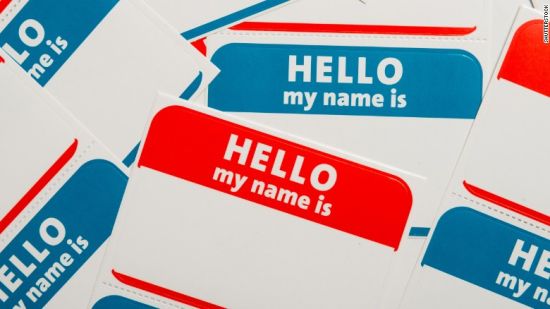科学解救:不擅长记名字并不是在撒谎(双语)
There is a very simple reason why it’s so easy for the names of new acquaintances to slip right out of your head within moments of being introduced: Names are kind of meaningless。
 资料图
资料图Memory experts say that the more pathways back to a memory you have, the easier it becomes to retrieve that memory, and this just doesn’t often happen naturally with names。
For example, even details as seemingly minor as what you were wearing on a particular day or what the weather happened to be doing can make it easier to recall other events that occurred that day, like the particulars of a conversation you had with a friend。
But names, on the other hand, usually don’t give your brain much information to grasp onto beyond the name itself。
Sure, there may be family history or a great deal of sentimental meaning behind a person’s first name, but when you meet someone at a party, there’s no readily apparent reason why this guy should be named Mike and that guy should be named Max. Names are "completely arbitrary, and hold no specific information in them," the narrator of a new AsapSCIENCE video on name-forgetting explains。
And if your brain can’t make connections between multiple pieces of information ... then you’re more likely to forget that information。
It’s much easier, on the other hand, to remember a person’s occupation, a phenomenon memory experts call the Baker-baker effect。
(As in, it’s easier to remember someone is a baker — perhaps because you’ve formed a mental image of your new acquaintance in a kitchen, covered in flour — than it is to remember that his or her last name is Baker。)
In one study, researchers first showed participants photographs of strangers, including a couple of lines on the person’s name and occupation, and asked them to recall that information a short time later, when presented with the picture again. The majority of the study volunteers got the person’s job correctly, but struggled with the name。
Memory experts offer ideas to counteract this annoying and often embarrassing psychological quirk, some of which work better than others in practice.You can try repeating the person’s name several times after the introduction, or invent associations between the name and some other piece of information — if her name is Cindy, picture her singing! — as the AsapSCIENCE guys suggest in an additional video offering tips
对方刚刚介绍了自己的名字,不出几分钟你就忘得干干净净,这种经历大家都有,其实原因也很简单:名字没有特殊含义。
记忆专家表示,与一段记忆联系的线索越多,越容易检索出此段记忆,但名字记忆通常没有这么多线索。
一些看似细枝末节的东西,比如你在某一天穿的什么或当天是什么天气都能帮助你回忆起那天发生的其他事情,比如你与朋友谈话的细节。
但名字却不是这样,除了名字本身,它通常不会给大脑留下更多的信息以让你记住它。
当然,一个人的姓背后可能有家族故事或很多情感意义,但当你在一次聚会上遇见某人时,并不明白为什么这个人应该叫迈克和那个人叫麦克斯。在解释人们忘记名字这个现象的AsapSCIENCE视频中,解说员这样说道:名字是"完全是任意,里面没有具体的信息。”
“如果你的大脑不能把多个片段信息连接起来....。.那么你很有可能忘记该信息。”
另一方面,要记住一个人的职业却容易的多,现象记忆专家称此为贝克——面包师效应。
(比如,我们很容易记得某人是一位面包师 — — 也许因为这个人介绍自己之后你脑海中形成了他在厨房,满身是面粉中的景象— —但要记住他或她的姓氏是贝克就难得多。)
在一个研究中,研究人员首先给参与者展示了陌生人的图片同时还有此人的姓名和职业,一小段时间后,再次给他们展示图片,让他们说出此人的信息。大多数志愿者答对了工作,但却总记不起名字。
记忆专家提出了一些建议来帮组我们对付这个令人讨厌,并常常令人尴尬的心理怪癖,有些人在实践中表现得比其他人更好。
在某人介绍了自己之后你可以试着将该人的姓名重复几次或联想一些其他信息和名字联系起来— —如果她的名字是辛迪,就想象她在唱歌!这也是AsapSCIENCE专家在另一个视频中提供的建议。
文章关键词: 双语

